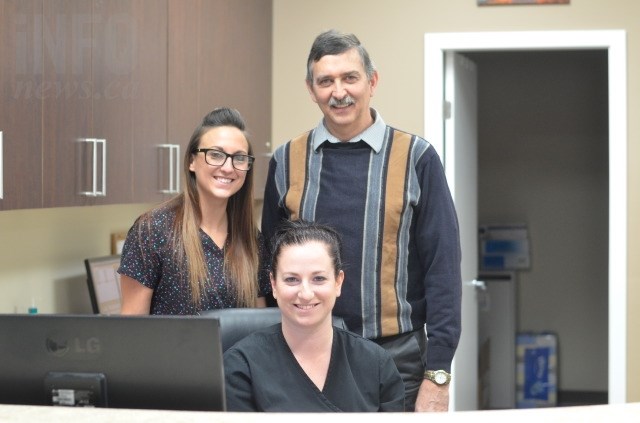
Jesslyn Lutgen, Lauren Fowler and Dr. Kobus le Roux.
(CHARLOTTE HELSTON / iNFOnews.ca)
December 07, 2017 - 8:00 PM
“PEOPLE DON’T KNOW ENOUGH ABOUT US”
VERNON - Whether there for pain management or for help fighting a drug addiction, hundreds of people are finding support and compassion at Vernon’s Methadone Clinic.
They are teenagers. Seniors. Business owners. Families.
“We have everyone from those literally living on the street to highly functioning people with businesses,” Dr. Kobus le Roux, one of the clinic’s three doctors says during an interview in the lobby.
The private clinic is bright and professional, decorated for the holidays with festive decorations. It’s been open in the present location on 32 Avenue since 2010, but the program has been running for more than 20 years.
Most of the patients, about 400 of them, are being treated for addictions while roughly another 100 are there for pain management. Receptionist Jesslyn Lutgen has been working at the clinic for several years and says she still sees a lot of shame and stigma associated with the methadone program. Sometimes, patients are reluctant to come in, asking instead to meet at a different medical clinic.
“They’ll say ‘I don’t want people to know that I come here,’” Lutgen says. “It’s hard to hear how quickly people get judged when they are the people trying to turn their life around. People don’t know the dedication it takes, and the courage it takes, to come in here and admit that you have a problem.”
Patients on the program are either prescribed methadone, or suboxone — a newer drug that is growing in popularity because it has fewer side effects and is easier to get off of. Both drugs will only work for someone with an opioid addiction, such as heroin, fentanyl, codeine, or dilaudid.
“Probably 75 per cent of people get the first prescription for legitimate reasons and never stop it again,” Dr. le Roux says, noting opioids are over-prescribed. “I think the wheel is slowly turning, but still, they prescribe it too much.”
The program requires a high level of commitment, including visiting the pharmacy every single day to pick up your dose, le Roux says. He admits that not everyone sticks with it, but says there is a high success rate for those that do.
Some people transition off of methadone or suboxone completely; for others, a daily dose remains part of their routine for years to come. Someone on a small, but regular, dose of methadone or suboxone is fully capable of holding down a job and raising a family — they’re not drug addicts.
“The whole purpose is not to feel high. It takes away the craving and you just feel normal,” office manager Lauren Fowler says.
“A lot of people who stay on it do well and are successful,” Dr. le Roux says.
The Methadone Clinic is often thrown around on social media forums as the source of Vernon’s homelessness and drug problems, but the staff say that is not the case.
“Many patients that you see here taking heroin or fentanyl are paying $200-$300 a day in drugs. Guys have to steal and do break and enters to afford it. Women prostitute for it. They share needles and paraphernalia. By using methadone, they can cut down on all that risky behaviour,” Dr. le Roux says.
“It takes away some of the risks to the public if they’re not breaking into vehicles or damaging parking meters to pay for drugs,” Lutgen adds.
They say the people coming in and getting help for their addictions are not the problem.
“I think people just don’t know enough about (the program) and are looking for something to blame,” Fowler says of the stigma attached to the clinic.
When asked if Vernon could benefit from more resources related to methadone, they shake their heads: the program is working, the issues are on the other side of the door. Housing is the main challenge: If people can’t get off the street, or get into safe housing away from the influence of old friends or associates, how can they get their lives back on track?
“There’s a gap once they get to being stable and wanting to get back to not living this lifestyle anymore,” Fowler says.
READ MORE: 'Monumental' announcement promises two modular housing projects to combat homelessness in Vernon
The clinic has patients in their teens up to their 80s. Many are struggling with a multitude of challenges.
“I’ve worked at other offices and seeing the people that come in here, they’re the realest people. Sometimes the nicest people too. They’d give you the shirt off their back,” Fowler says.
Some who have finished the program even stop in to say hello if they’re in town, Lutgen says.
“I think a lot of people would call us friends or family. They look forward to coming here and seeing us,” Fowler says.
The clinic gets funding from the Ministry of Social Development so that individuals on income assistance or disability can get their prescriptions free of charge. There are also two counsellors from Interior Health who provide services to clients.
“We want people to know this is a safe place for people who need help,” Fowler says.
Anyone interested in the program can call 1-778-475-5810 or visit the clinic at 103 - 3310 32 Ave.
To contact a reporter for this story, email Charlotte Helston or call 250-309-5230 or email the editor. You can also submit photos, videos or news tips to the newsroom and be entered to win a monthly prize draw.
We welcome your comments and opinions on our stories but play nice. We won't censor or delete comments unless they contain off-topic statements or links, unnecessary vulgarity, false facts, spam or obviously fake profiles. If you have any concerns about what you see in comments, email the editor in the link above.
News from © iNFOnews, 2017